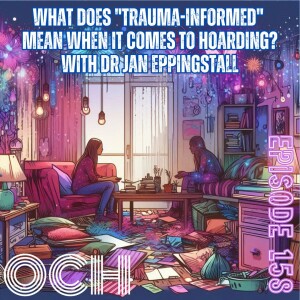
Friday Sep 27, 2024
#158 What does "trauma-informed" mean when it comes to hoarding? With Dr Jan Eppingstall
Come to a Dehoarding Accountability Zoom Session: http://www.overcomecompulsivehoarding.co.uk/ticket
Subscribe to the podcast: https://www.overcomecompulsivehoarding.co.uk/subscribe
Podcast show notes, links and transcript: http://www.overcomecompulsivehoarding.co.uk/
In today’s episode, I’m chatting with Dr. Jan Eppingstall, a Melbourne-based counsellor, about what it means to take a trauma-informed approach to hoarding disorder. Stick around as we break down why understanding trauma is crucial for effective support and treatment.
- Trauma-informed approaches to understanding and treating hoarding
- Importance of understanding trauma's impact
- Concerns about wellbeing inquiries without adequate support preparation
- Collaboration in Trauma-Informed Care
- Practical Implementation for Non-Therapy Roles**
- Incorporate trauma-informed principles
- Sensitivity to potential triggers
- Misconceptions and Communication
- Fear factor surrounding trauma and its treatment
- Detailed trauma disclosure unnecessary for effective support
- Client Autonomy and Professional Boundaries
- Respecting clients' communication preferences
- Retraumatisation in Hoarding
- Harm of forced clearances and strangers touching possessions
- Negative impact of language and actions on hoarders
- Respectful Support Practices
- Building Trust
- Importance of building trust before intervening in a hoarder's space
- Ensuring professionals genuinely practice trauma-informed care
- Over-explaining as a stress response
- Broad approach of trauma-informed care
- Factors influencing trauma perception
- Trauma Definition
- Trauma and Hoarding
- Commonality of trauma in hoarding histories
- A supportive framework rather than a treatment model
- Five Pillars of Trauma-Informed Care
- Assuming trauma backgrounds in hoarding behaviour clients
- Loss of Control in Trauma
- Trauma involves loss of control; care pillars help restore it
- Tracking and managing nervous system responses
- Importance of recognising client-specific signs
- Term misuse by minimally trauma-informed trained professionals
- Dangers of Misleading Trauma Informed Claims
- Proper understanding of trauma to avoid harm
- Non-therapists adopting trauma-informed principles
- Importance of feeling present and calm during therapy
- Teaching clients to feel safe and grounded
- Clear Boundaries in Therapy
- Trauma Types and Responses**
- Variability of trauma
- Explanation of retraumatisation
- Managing Retraumatisation
No comments yet. Be the first to say something!